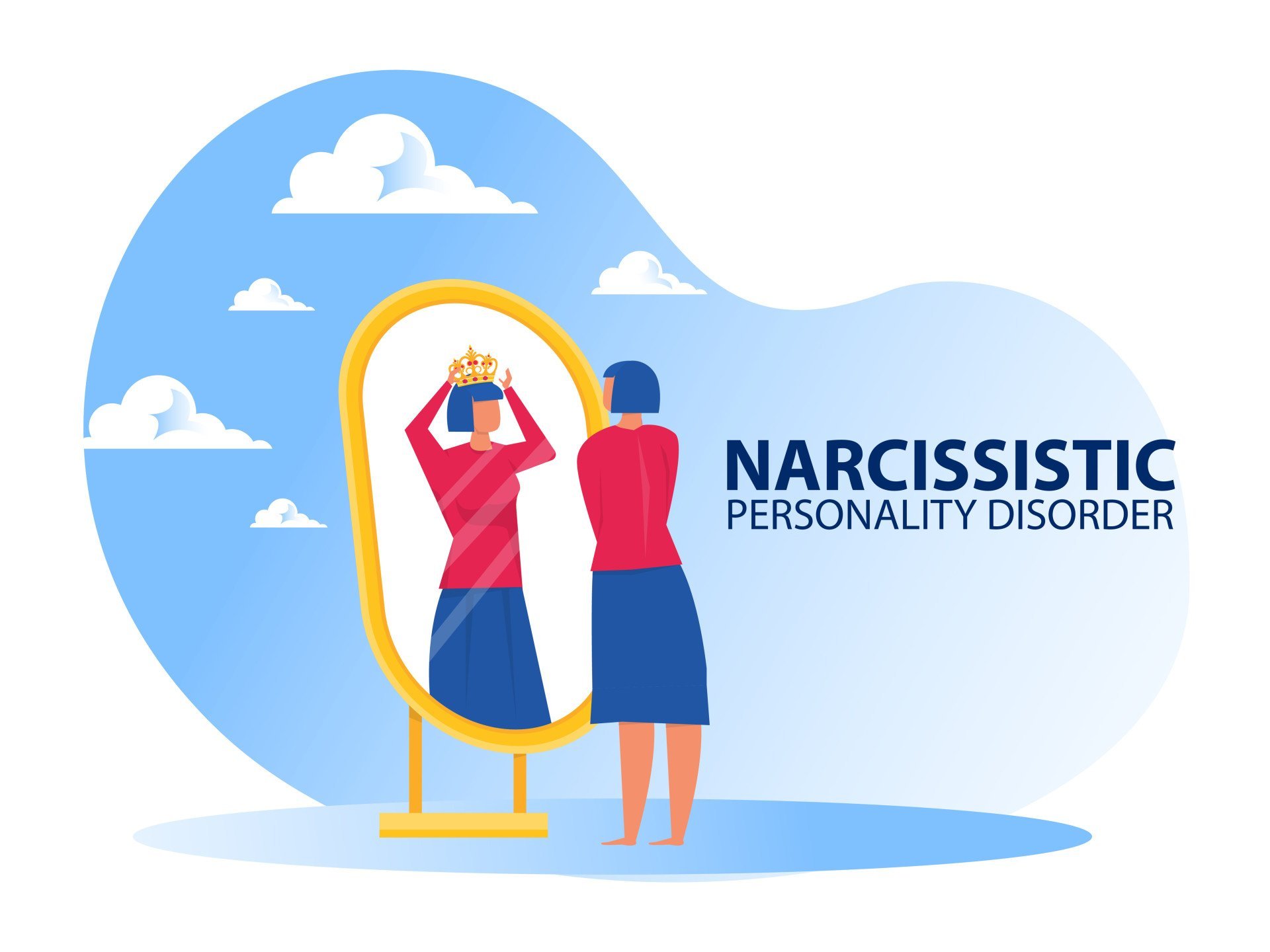What Happens When Two Narcissists Fight?
Narcissism, a behavior stemming from an inflated sense of self-importance and lack of empathy for others, is not uncommon in contemporary society.
While everyone may show some narcissistic traits at times, consistently high levels of narcissism can lead to destructive patterns and relationships.
Particularly perplexing, yet fascinating, is the explosive meeting ground where two such personalities collide, a phenomenon frequently characterized as a narcissistic showdown fallout.
The primary scenario of conflict between two narcissists
Envision a battlefield where two mighty egos clash, each unwilling to express vulnerability or cede ground to the other.
This interplay sets the stage for a classic "battle of egos" scenario, where both parties seek to affirm their superiority.
Like two gladiators locked in a struggle for dominance, neither side tends to back down easily.
Their inflated sense of self amplifies the conflict, dragging it out into a prolonged and often chaotic exchange.
Significance and potential consequences of narcissistic clashes
To understand the potential consequences of this duel between narcissists, it is important to grapple with the layers of emotional tension and psychic turmoil involved.
The impact and fallout extend beyond the immediate sphere of the individuals directly involved, making it a complex and potentially challenging situation to navigate.
With unique dynamics and numerous variable factors at play, this phenomenon holds significant relevance to a wide array of social contexts and beckons for a deeper exploration into the heart of the narcissistic confrontation aftermath.
Deep Dive into the Profile of a Narcissist
Definition and Identification
Narcissism often carries negative connotations due to its associated characteristics – a grandiose sense of self-importance, lack of empathy for others, and the constant need for validation and admiration.
These traits create a specific profile for the "narcissists in conflict”, making them both a compelling and contentious subject to explore.
Recognizing narcissistic traits of male or female is the first step to understanding the dynamics when narcissists clash.
If you still want more clarity, I have written a detailed guide comparing the traits of both male and female narcissists on Judge Anthony.
A narcissistic personality is typically identified by characteristics such as a sense of entitlement, frequent displays of arrogance, and a tendency for manipulation.
This inflated self-image means that when two narcissists collide, the resulting narcissistic personality clash is a highly charged and volatile situation, often leading to a complex "battle of egos".
Impact on Relationships
Narcissism can take a significant toll on healthy relationships.
The very qualities that define narcissists – self-centrism, lack of empathy, and quest for constant admiration – make them challenging partners or peers in both personal and professional spaces.
Whether in friendships, families, or intimate relationships, the presence of a narcissist can create consistent tension, even more so when two narcissists are involved.
The result of narcissistic disagreement can encompass a wide range of fallout, from emotional trauma to severed ties.
Case studies reveal that narcissists tend to seek out people who will meet their needs for validation and admiration, and in the process, may unconsciously mirror these traits.
Thus, patterns of narcissism in a toxic relationship often comprise power struggle leading to an eventual demise.
The Narcissistic Personality Disorder (NPD)
Narcissistic Personality Disorder (NPD) is a clinical condition characterized by inflated personality traits, revealing another level of complexity in narcissistic showdown fallout.
Individuals with NPD not only possess grandiosity and a controlling demeanor, but they also have an often-frustrated need for admiration, coupled with a marked lack of empathy towards others.
NPD is not just about personality; its characteristics qualify it as a diagnosable mental health condition.
Symptoms include an overwhelming need for constant admiration, a sense of superiority, preoccupation with fantasies about success, power, beauty, or the perfect mate, and hypersensitivity towards perceived criticism, even when none exists.
Emotions run high, making the consequences of a narcissist fight intense, particularly when both parties have NPD.
In a clash between two narcissists grappling with Narcissistic Personality Disorder (NPD), mutual respect is absent. The conflict revolves around fulfilling their own needs, with manipulative behavior and emotional blackmail taking center stage as each defends their own ego, reflecting the challenges of such relationships driven by self-interest.
The Anatomy of a Narcissistic Clash
Setting the Battlefield
Understanding the conditions that spark a narcissistic personality clash involves recognizing the underlying motivations of a narcissist.
The idea of a threat to their self-perception, infringing on their space of control, or simply being outshone can set off fireworks.
In essence, any scenario that runs counter to their grandiose self-belief is a potential hot spot.
The pivotal role of ego in these clashes cannot be overstated.
Ego plays a powerful part in setting the battlefield for narcissists in conflict, as their inflated self-image and inability to tolerate disagreements makes them prone to a 'narcissism collision course'.
A narcissist’s fight is not about expressing differing opinions or finding common ground, but rather about validating their perspective as the only one that matters.
Power Dynamics in Narcissistic Fights
The power dynamics within narcissistic fights hinge on the concept of 'narcissistic supply' - the attention, admiration, and affirmation that narcissists desperately seek.
This quest for dominance exacerbates their desperate need for narcissistic supply, fuelling the fire in the duel between narcissists.
It is driven by their urgent need to safeguard their ego, which instigates a no-holds-barred battle of wills.
Harmful tactics are often employed by narcissists during conflicts, further heightening the tension.
These include manipulation, gaslighting, and blame-shifting.
You can take a look at these examples of narcissist gaslighting to understand better.
Their aim remains to belittle the other person and emerge as the 'winner', which often leads to a significant emotional impact from the narcissistic fight for the victim.
The Aftermath of a Narcissistic Battle
The fallout of a narcissist argument can be cataclysmic.
Considering the depth of harm a single narcissist can inflict, one can only imagine the consequences of a narcissist fight where both parties are narcissists.
Victims can find themselves caught in a cycle of emotional upheaval characterized by manipulation, coercion, and mind games.
The level of toxicity can lead to severe mental and emotional erosion, affecting personal well-being and overall life.
Examples of post-conflict scenarios involving narcissists can be found in all walks of life, from high-profile celebrity feuds to deeply personal narratives, offering a grim portrayal of narcissistic confrontation aftermath.
Each instance underscores the turmoil and emotional wreckage that such fights can inflict and the long-standing influence it may have on those involved.
Strategies for Resolving Narcissistic Conflicts
The Role of Professional Intervention
Faced with the fallout of a narcissist argument, professional intervention becomes an important tool in moderating and managing the conflict.
Therapy and counseling provide avenues for addressing narcissistic tendencies, empathetic listening, and insight-driven discussion.
These interventions help in deconstructing the narcissistic thought process, enabling individuals to reconcile their inflated self-esteem with reality.
Many testimonies highlight the effectiveness of therapy in treating narcissism, particularly in reducing the narcissists' tendency towards harmful behaviors and strategies.
These narratives provide comfort and hope, encouraging individuals to seek help and prevent the exacerbation of narcissists in conflict.
Self-help Techniques for Narcissists
Alongside professional help, self-help strategies can be valuable aids for narcissists seeking to understand and regulate their behavioral patterns.
Adaptive and healthy relationship coping mechanisms could include mindfulness practices, engagement in genuine listening, fostering genuine empathy, and breaking patterns of seeking constant admiration.
Self-awareness is crucial in this process.
Narcissists willing to acknowledge their condition and make conscious efforts towards change can significantly reduce the tension in narcissistic relationships.
Introspection also proves to be a powerful tool, helping individuals recognize triggers, understand emotions, and implement healthier responses.
Support for Those Affected by Narcissistic Fights
Being caught in the crossfire of a narcissistic fight can be emotionally damaging.
It's crucial to offer guidance and support to those affected by such a relationship.
Strategies for coping could include setting firm boundaries, taking care of emotional well-being, seeking supportive communities, and if necessary, distancing one’s self from the conflict.
There are various resources and support networks available for individuals navigating through the emotional impact of narcissistic fights.
Online platforms such as forums, blogs, and charity-run websites offer a wealth of information, advice, and consolation from those who have experienced similar situations.
After all, resilience often sprouts from empathy and shared experiences, providing an ardent source of comfort for those grappling with the aftermath of a narcissistic showdown fallout.
Making Sense of Narcissistic Clashes
The vibrancy of human personality can lead to a spectrum of fascinating interactions.
At times, this interplay transcends the ordinary, morphing into something significantly more intense and complex, particularly in narcissistic conflicts.
In trying to untangle the knots of such conflicts, it becomes apparent that the interaction between two narcissists forms a distinctive landscape of tension, dispute, and emotional disturbance.
However, the fallout of the narcissist argument isn’t a foregone conclusion, but rather a complex tapestry woven from various threads, including tender egos, a ceaseless quest for dominance, and the resultant emotional toll.
Understanding and Managing Narcissistic Showdown Fallout
Understanding the ins and outs of these conflicts also redeems the reins of control.
The knowledge illuminates the path ahead, paving the way toward more effective confrontation and management of narcissistic spats.
It underscores the need for professional intervention, self-help techniques, and supportive networks for those directly and indirectly involved in such disputes.
The potency of empathy, patience, and concrete boundaries cannot be opaque; indeed, they form the cornerstone of dealing with narcissistic showdown fallout.
FAQs (Frequently Asked Questions)
1. What happens when two narcissists engage in a conflict?
When two narcissists engage in a conflict, it often escalates into what's commonly referred to as a "narcissistic showdown fallout."
This clash of personalities is characterized by an intense battle for dominance, where neither party is willing to express vulnerability or yield ground.
The resulting conflict tends to be highly charged and volatile, driven by each narcissist's inflated sense of self-importance and need for validation.
2. How does narcissism impact relationships, especially when both parties involved are narcissists?
Narcissism can take a significant toll on relationships, even more so when both parties involved exhibit narcissistic traits.
These traits, including self-centeredness, lack of empathy, and a constant need for admiration, create consistent tension and power struggles when you are involved in abusive relationship.
The result can range from emotional trauma to severed ties, as both narcissists vie for dominance and validation.
3. What strategies can individuals employ to resolve conflicts stemming from narcissistic clashes?
Resolving conflicts stemming from narcissistic clashes often requires a multifaceted approach.
Professional intervention, such as therapy and counseling, can provide avenues for addressing narcissistic tendencies and fostering empathy and understanding.
Additionally, self-help techniques, including mindfulness practices and fostering genuine empathy, can aid narcissists in regulating their behavioral patterns.
Seeking support from communities and setting firm boundaries are also crucial steps in navigating the aftermath of narcissistic conflicts.
Conclusion
Navigating through the tornado of narcissistic conflicts can come across as an arduous task, but with adequate coping mechanisms and the right support, it is far from insurmountable - a testament to the resilience of the human spirit, even amidst the duel of narcissists.
After all, the fabric of human dynamics is all about embracing every thread, even those that jarringly stand out, knitting together a larger pattern of understanding and coexistence.





